Could Leo Szilard have been tried as a war criminal? Now, before anyone starts to wonder if this is a misleading or inflammatory headline, let me say up front: this was a question that Szilard himself posed in a 1949 story published in the University of Chicago Law Review titled, “My Trial as a War Criminal.” It is a work of fiction, but Szilard was serious about the questions it raised about the morality of the atomic bomb.1
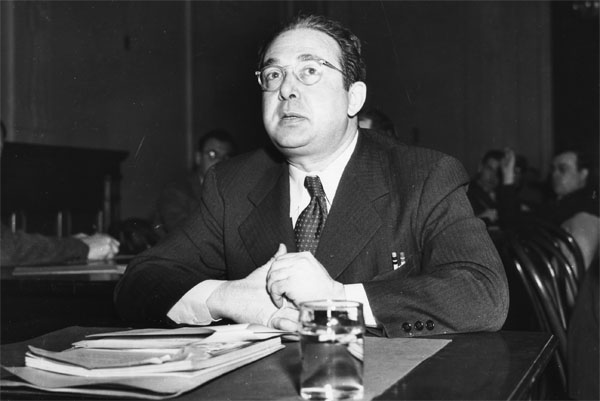
Szilard testifying before Congress in the postwar. From the Emilio Segrè Visual Archives.
Leo Szilard is one of the most colorful characters in the story of how the atomic bomb got made. An eccentric Hungarian, one of the “Martians” who emigrated to the United States during World War II, Szilard aspired to always being one step of head of the times. You didn’t have to be much ahead to make a difference, he argued, just a little bit. One example of this he gave in a later interview regards his decision to flee Germany shortly after the Reichstag fire. On the day he left, it was an easy trip on an empty train. The next day, the Germans cracked down on those trying to flee. “This just goes to show that if you want to succeed in this world you don’t have to be much cleverer than other people, you just have to be one day earlier than most people. This is all that it takes.”2 In 1939, Szilard was the one who famously got Albert Einstein to write to President Roosevelt, launching the first US government coordination and funding of fission research. During the Manhattan Project itself, Szilard worked at the University of Chicago, helping to develop the first nuclear reactor (CP-1) with Enrico Fermi. After this, though, his active role in the bomb project declined, because General Groves hated the man and worked to exclude him. He attempted in various ways to influence high-level policy regarding the bomb, but was always shut out.
But after the war, Szilard found his place — as a gadfly. He wasn’t a great bomb developer. He was, however, a great spokesman for the dangers of the atomic bomb. Irrepressible, clever, and impossible-to-look-away-from, Szilard could steal the stage, even if no American could pronounce his name. It is in this context that his article, “My Trial as a War Criminal,” was written. The notes on the University of Chicago Law Review version note that it was written in June 1948, but because of “political tensions” Szilard put it off. With the “relaxation” of tensions, Szilard deemed it possible to publish in the Autumn 1949 issue. One wonders exactly what Szilard had in mind; in any case, given that the US first detected the Soviet atomic bomb in September 1949, and from there launched into the acrimonious debate over the hydrogen bomb, it seems like Szilard’s sense of timing in this instance was either perfect or terrible.

“My Trial as a War Criminal” starts right after World War III has been fought. The Soviet Union has won, after using a new form of biological warfare against the United States.
I was just about to lock the door of my hotel room and go to bed when there was a knock on the door and there stood a Russian officer and a young Russian civilian. I had expected something of this sort ever since the President signed the terms of unconditional surrender and the Russians landed a token occupation force in New York. The officer handed me something that looked like a warrant and said that I was under arrest as a war criminal on the basis of my activities during the Second World War in connection with the atomic bomb. There was a car waiting outside and they told me that they were going to take me to the Brookhaven National Laboratory on Long Island. Apparently, they were rounding up all the scientists who had ever worked in the field of atomic energy.
In the story, Szilard was given a choice: he could stand trial for being a war criminal, or he could go to Russia and work with them over there. Szilard opted for the former, claiming he had no capability to learn Russian at that point in his life, and that he had no interest in making himself a servant of Soviet science. He is then interrogated at length about his political views and his work on atomic energy. The Soviets have read his articles in the Bulletin of the Atomic Scientists (“Calling for a Crusade” and “Letter to Stalin“) but think they are naive. Szilard reports no real acrimony, however.
His trial for war crimes begins a month later in Lake Success, New York. He was, “apparently as a special favor,” one of the first to be tried. Two major charges were levied against him. The first was that he had tried to push the United States towards developing nuclear weapons in 1939 (the Einstein-Szilard letter). In the eyes of the prosecutor, this was when World War II was still “an imperialist war, since Germany had not attacked Russia until 1941.” The second charge was that he contributed “to the war crime of dropping an atomic bomb on Hiroshima.”
Szilard has several defensive arguments in his favor. First, he points out that he in fact presented a memorandum to (future) Secretary of State James Byrnes in May 1945 which argued that the atomic bomb should not be first used against Japan cities. This memo had been published in the Bulletin as well in December 1947. Second, he also noted that he circulated a petition in July 1945 that called for not using the bomb as a military weapon before giving the Japanese a chance to surrender first, and that he attempted to put it in front of President Truman himself.
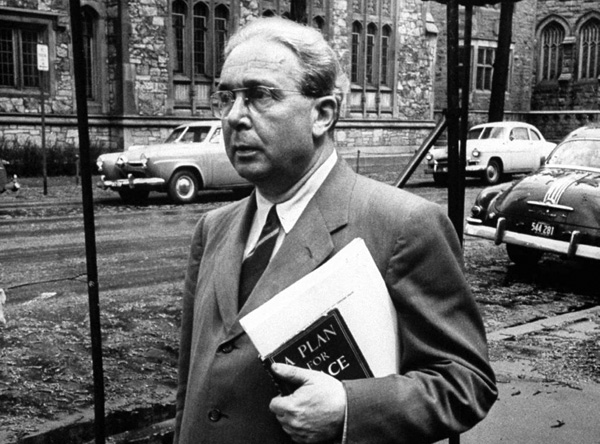
Leo Szilard at the University of Chicago in 1954. Source.
Both of these defenses, however, were easily countered. In the case of the memo to Byrnes, an original copy could not be found, and the Bulletin copy had many deletions for security reasons, any one of which could have contradicted the published material. In the case of the petition to Truman, it was noted that it never made it to Truman, because Szilard submitted it by way of General Groves, who of course squashed it. The Russian prosecutor said that Szilard should have known that the architect of the Manhattan Project would never have transmitted such a thing up the chain of command. So neither were considered adequate at exculpating Szilard.
Szilard is then released on bail. The rest of the story concerns the trials of Secretary of War Stimson, Secretary of State Byrnes, and President Truman. This part revolves around a legal discussion of what it means to be a “war crime.” In the story, the tribunal adopts the definition used at Nuremberg that a war crime was any “violations of the customs of war” and “planning a war in violation of international agreements.” The use of the atomic bombs was necessarily a violation of the customs of war, because it was not customary to drop atomic bombs on other nations during World War II. And the Russian prosecutor was able to gather ample evidence that various US officials had urged war with the Soviet Union under conditions not allowed by the United Nations charter, which only allows war in the face of armed attack. So when Byrnes wrote in a book that the United States should consider “measures of last resort” if the Soviets refuse to leave East Germany, this was taken as evidence of the latter charge. (Refusing the leave occupied territory is not an “armed attack,” and “measures of last resort” can only be understood as implying war.)
Stimson’s section gets the closest to the meat of the question — whether the atomic bombs were justified. Stimson’s defense is the same as his 1947 article from Harper’s — that the bombs were used to hasten the war and to save a net number of lives. The Russians point out, however, that even the US Strategic Bombing Survey concluded that the atomic bombs were not necessary to end the war,3 and that Stimson had access to sufficient intelligence about Japanese communications to know that Japan was on its last legs.
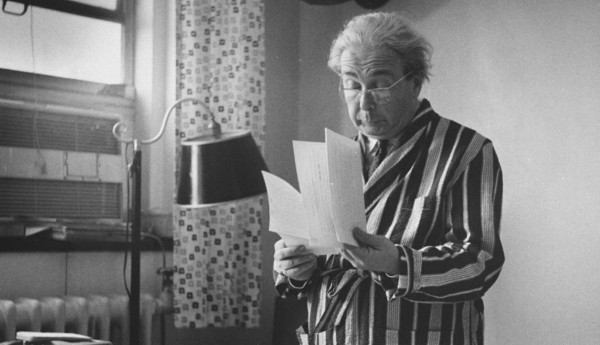
Szilard receives notice that he has won the “Atoms for Peace” award in 1960. At the time, he was in a hospital, being treated (successful) for bladder cancer. Source.
In the end, Szilard notes that practically all of them were expected to be found guilty. But a deus ex machina saves the day — the Soviets’ viral biological agents somehow get out to their own populations, their vaccines fail, and the United States is desperately appealed to for assistance. Under new settlement terms, all war crime prosecutions were ended, and “all of us who had been on trial for our lives were greatly relieved.”
Such ends Szilard’s story. It’s a curious one, and doesn’t go where you might think based on the title alone. Szilard seems to be making a strong point about the way in which war crime tribunals always favor the winners, and that if you apply the Nuremberg standards to the United States’ conduct during World War II and the early postwar, it is clear that no one, even a dissident like Szilard, would be safe. It isn’t a hand-wringing, self-flagellating confession. There is none of the “physicists have known sin” moralizing of J. Robert Oppenheimer. It isn’t even a discussion of what happened regarding the atomic bombing, whether it was justified or not, whether it was terrible or not. It is a gentle story, albeit one that subtly introduces a revisionist argument about the bombings of Hiroshima and Nagasaki, one that continues to be debated to this day.
One can also read the piece as being instead a complaint about the definition of “war crimes” from Nuremberg — are they nothing more than using new weapons and talking about war? The actual Nuremberg principles, also include “wanton destruction of cities, towns, or villages, or devastation not justified by military necessity.” Now whether the atomic bombings fall under that is a tricky question — how does one define “justified by military necessity”? On this sort of unclear requirement, the whole edifice hinges.4
This whole story came to my attention because Bill Lanouette, author of the Szilard biography Genius in the Shadows, e-mailed me after seeing my post on Andrei Sakharov. He noted that according to Rhodes’ Dark Sun, Sakharov was very affected by Szilard’s story. Sakharov showed it to his colleague Victor Adamsky, who reported that:
A number of us discussed it. It was about a war between the USSR and the USA, a very devastating one, which brought victory to the USSR. Szilard and a number of other physicists are put under arrest and then face the court as war criminals for having created weapons of mass destruction. Neither they nor their lawyers could make up a cogent proof of their innocence. We were amazed by this paradox. You can’t get away from the fact that we were developing weapons of mass destruction. We thought it was necessary. Such was our inner conviction. But still the moral aspect of it would not let Andrei Dmitrievich and some of us live in peace.5
What’s interesting to me is that the Soviet weapon designers seem to have read Szilard’s story in a much more moralistic light than I did. For me, Szilard’s story is more about the difficulty of having anything like a consistent stand on what “war crimes” might be — that the actions of the United States could easily be seen from another nation’s perspective as highly damning, even if from a more sympathetic position they might be justifiable. Sakharov and Adamsky apparently understood the story to be about the indefensibility of working on weapons of mass destruction full-stop. It is a curious divergence. Assuming my reading is not naive, I might suggest that the Soviet scientists saw not so much what they wanted to see, but what confirmed their existing, latent fears — something in Szilard’s story resonated with something that they already had inside of them, waiting to be released.
- Leo Szilard, “My Trial as a War Criminal,” University of Chicago Law Review 17, no. 1 (Autumn 1949), 79-86. It was later reprinted in Szilard’s book of short stories, The Voice of Dolphins. [↩]
- Spencer Weart and Gertrude Weiss Szilard, eds., Leo Szilard: His version of the facts; Selected recollections and correspondence (Cambridge, Mass.: MIT Press, 1978), 14. [↩]
- “Based on a detailed investigation of all the facts, and supported by the testimony of the surviving Japanese leaders involved, it is the Survey’s opinion that certainly prior to 31 December 1945, and in all probability prior to 1 November 1945, Japan would have surrendered even if the atomic bombs had not been dropped, even if Russia had not entered the war, and even if no invasion had been planned or contemplated.” [↩]
- Szilard’s story also notes that just because these principles were developed after the war ended did not prohibit them from being applied to activities during the war — otherwise all of the Germans would have gotten off the hook. [↩]
- Richard Rhodes, Dark sun: The making of the hydrogen bomb (Simon & Schuster, 1995), 582. [↩]
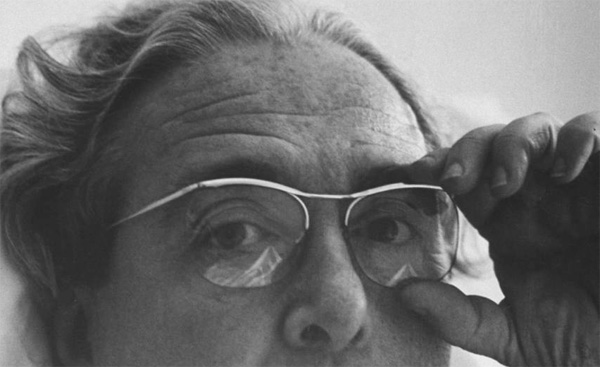
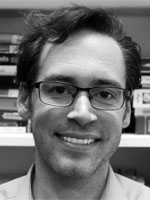
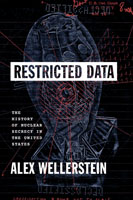
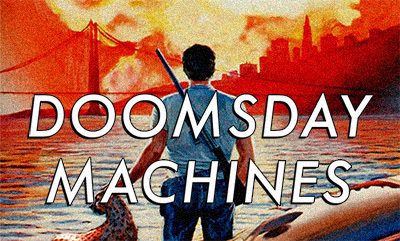
Great posting. On the matter of timing of publication: When Szilard wrote the paper in June 1948, Berlin crisis was beginning so it was then very tense. By the summer of 1949, that crisis had been defused, so tensions had eased. This would have to be checked out but the paper had probably been sent to and accepted by U of Chicago Law Review before the Joe I test. The timing was strange but the future is hard to predict.
I think Sakharov understood the point of Szilard’s story perfectly.
The Swiftian satirical style that Szilard chose to use has both advantages and drawbacks. Many people read Gulliver’s Travels as an adventure story, and Swift’s devastating social critique mostly escapes them.
Writers resort to such a technique when their message can’t be stated openly, and-or their readers’ preconceptions would prevent them from even considering it if stated directly.
Szilard’s message was that the use of atomic bombs on Hiroshima and Nagasaki was a war crime. And that the use of weapons of mass destruction was a war crime, pure and simple. But to say that openly would have marginalized him as a dissident, a communist, a traitor.
Szilard’s placement of himself as a defendant in the story is a truly Swiftian touch. It brilliantly reverses the reality that it is Szilard himself who accuses. By including himself among the accused, he is able to discuss the culpability of those most directly responsible — without actually appearing to do so.
His role as the least-culpable defendant also allows him to highlight his most subversive point of all: If a person participates in the creation of weapons of mass destruction, can they ever be completely innocent of the consequences?
Sakharov GOT that. And it affected him deeply.
Gene Dannen
I have been following your blog since last summer. I happened upon it quite by accident, but it has turned out to be a happy accident. Your NUKEMAP led me here.
I truly enjoy your writing style, which, considering your subject matter, could have been dry and technical but is instead illuminating and in no way patronizing.
It is refreshing to find a writer who is fearless in his pursuit of the truth and facts of a matter. I have long been interested in this period in history and the coming about of nuclear weapons and nuclear science, and your blog scratches that itch for me.
I look forward to further posts, and I applaud that which you have already done. Also, the NUKEMAP is nothing short of brilliant. I do hope, for the sake of future generations, that it will be used instructionally as way to make nuclear weapons and their effects more tangible.
Sincerely, — Lori
Brilliant piece of writing on a little known piece of history. Thank you for sharing.
The more I learn about Szilard, the more I want to hang out with him. Born too late… Kudos on another great post!
“Sakharov and Adamsky apparently understood the story to be about the indefensibility of working on weapons of mass destruction full-stop.”
“And at the same time, there was an interest in the U.S. in developing weapons that might be called more “humane” as opposed to “conventional” weapons. In 1955, Congress was entertained by Major General Creasy, who described what LSD could do. At the time, that was the latest drug of interest. And as he described it to Congress, they became very enthusiastic, and voted in favor of doing research into LSD as a possible incapacitating agent that would be life-sparing. Congress passed a resolution with only one vote against it, which is perhaps indicative of the philosophy of the times.”
—When I read the above by James Ketchum, my thought was so many other weapons in the world in 1955, why did the Congress want to make any more? If all the human race had to deal with was what they could do up to 1955, with guns, bombs, mustard gas, and so on, it would still be a horrible mess.
—But when I read the phrase “indefensibility of working on weapons of mass destruction full stop,” I thought: “Congress and James Ketchum didn’t think of this as a WMD. I thought of this as another WMD.”
—Okay…so I’m wrong, and the Congress was right? halucinagenic nerve gasses are not WMD?
http://www.10zenmonkeys.com/2007/01/10/hallucinogenic-weapons-the-other-chemical-warfare/
Bradley Laing;
In my present day and grass-roots-educated opinion, hallucinogenic compounds and nerve gases should be considered WMD. However, in the 1950s and 1960s the study of such things was far outside the mainstream, and as such were not then considered WMD.
The U.S. Military researchers currently, by dint of their nature, do research on these experimental things, and are probably, at this very moment, researching things we have no knowledge of. It follows that the U.S. Congress is complicit and even encouraging these efforts in the name of National Defense, just as it encouraged and abetted similar efforts in those earlier times. These are not issues to be wondered at.
The current wisdom of the times has a way of showing up later as folly. It has always been thus. Therefore, it behooves us to keep as close as eye as we can on our present government. This is and always has been difficult, but is becoming less so because of modern technological advances, which are thus far outside the military’s ability to fully control. Thank goodness for that!
A great post that adds much needed dimension to Leo Szilard’s character. I have always been curious about why Franck’s Committee on Social and Political Implications with the likes of Francks and Seaborg chose Szilard to be its appointee to conform the report and be its spokesman (Szilard did have editing help from Rabinowitch). Thanks again for the great work you do. http://coldwarwarrior.com/2014/02/26/the-nuclear-hydra-proliferation/
A couple of thoughts…
No doubt most – if not all – nuclear weapons scientists (the world over) suffered from intense pangs of guilt as a result of their efforts: After all, no one on the planet really understood the ramifications and implications of their work as clearly as they did. This is a common thread in historical accounts of the development of nuclear weapons, headlined by J. R. Oppenheimer’s famous quote: “Now I am become death, the destroyer of worlds.” Oppenheimer later (in 1965) followed his quote with another observation: “I suppose we all thought that, one way or another.” It is likely that each scientist close to the Manhattan project, as well as those in the Soviet Union and elsewhere involved in the same efforts, understood the long-term implications of the demon they had participated in creating.
In a real sense, most augmentations of the machinery of war can be considered a “weapon of mass-destruction”. The British use of smallpox against the American Indians in 1763 is just one example.
In 1945 the war-weary American political leadership, as well as the nation as a whole, were horrified at the prospect of the staggering projected losses of American soldiers as a result of invading the Japanese homeland, had to have been gratified at the arrival of a new weapon that could avoid that unthinkable bloodshed. The projected numbers of losses on each side can certainly be debated, what can NOT be debated is the consistently demonstrated will of the Japanese soldier to fight to the death – to the very last man. It was reasonably extrapolated by US decision-makers that the coming Japanese defense of their very homeland would would multiply this ethos to the very last man, woman, and maybe even child living therein.
Lastly – The physics of nuclear and thermonuclear weapons belong to no country, but rather to the fields of science, engineering, and chemistry. Any nation which did NOT pursue such knowledge would be doomed to be an also-ran, or perhaps even a smoking, radioactive hole in the earth.
Characterizing Szilard’s effulgence of conscience as morally correct misses the point. Dire times require dire actions, and sadly – as amply demonstrated in historical the arc of human warfare – standing still often translates a nation or a people onto the trash-heap of the defeated. It’s not as if Leo Szilard and the rest of the Manhattan scientists hadn’t lead the way in the development of atomic weapons that they WOULDN’T have been developed by someone else, and it’s also not as if any political entity faced with the awful choices that faced Harry Truman in 1945 that they would have chosen any but the most direct path to victory – regardless of the cost to the enemy.
It can be convincingly argued that Lemay’s fire-bombing of Japanese population centers in early 1945 were a far worse implementation of “weapons of mass destruction” than the later atomic bombings of Hiroshima and Nagasaki.
In conclusion: I feel our retro-spectroscopes are working very well indeed, and that it’s easy to second-guess the decisions of those in power at that time. Further – it’s easy to speculate about the correctness of their awful decisions. I can only say that personally, I believe that such decisions are endlessly agonized over by those who have to make them. They are not lightly or blood-thirstily taken. They represent the best informed instinct available to the HUMANS we collectively selected to make such decisions.
And – most importantly – NOT pursuing that horrific science would have been tantamount to abdicating that power to some other political entity; and history has shown that to likely be a suicidal decision.
Biggest Lew
If you think that Truman had any clue what he was doing, you should read the documents on my “Atomic Bomb: Decision” website.
http://www.dannen.com/decision/
Truman thought he had ordered the atomic bomb used on “purely military” targets, and no women or children would be harmed.
The great decisions of history are not, in fact, made by wise and rational men. In the nuclear age, that is a recipe for disaster.